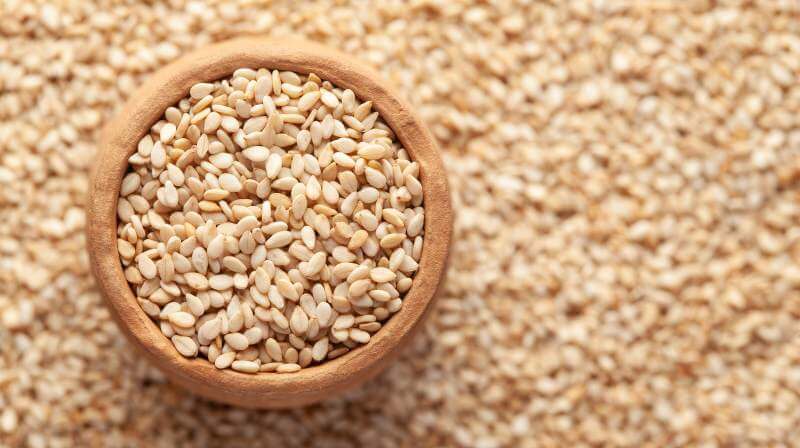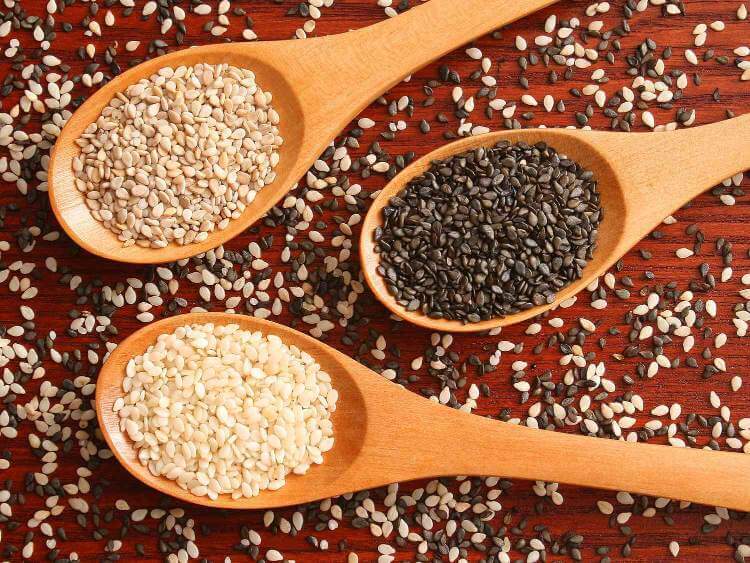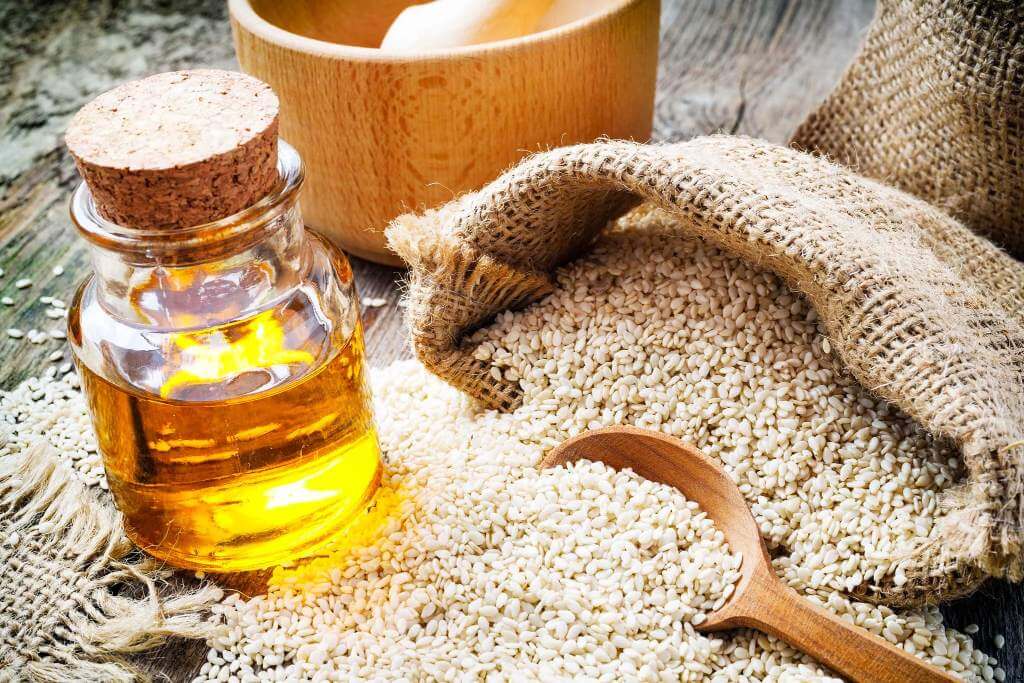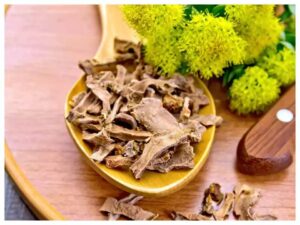The Origins of Sesame: A Tale of Discovery and Delight
The Prehistoric Beginnings
As we delve into the intriguing world of sesame seeds, it’s essential to start our journey by exploring their ancient beginnings. Sesame seeds are believed to have originated in the Indian subcontinent, where they were first cultivated over 3,000 years ago. The seeds quickly spread throughout the region, captivating the hearts and palates of those who encountered them.
The Ancient Egyptians and their Love for Sesame
The enigmatic allure of sesame seeds was not lost on the ancient Egyptians. By 1500 BCE, the sesame plant had made its way to Egypt, where it became an essential part of their culinary and medicinal practices. Egyptians revered the seeds for their supposed magical properties, often using them in their religious ceremonies and rituals.
From Persia to the Roman Empire: Sesame’s Expansion into the West
As the world became more interconnected through trade routes, sesame seeds began to travel beyond their initial borders. By 500 BCE, sesame had found its way into Persia, where it was cherished for its oil content and used in various dishes. The ancient Persians introduced sesame seeds to the Greeks, who then brought them to the Romans. The Romans marveled at the seeds’ versatility and flavor, integrating them into their cuisine and medicinal practices.
The Silk Road: A Pathway to Sesame’s Global Spread
With the establishment of the Silk Road, sesame seeds began to spread even further. The Silk Road was a vast network of trade routes that connected the East and West, facilitating the exchange of goods, ideas, and cultures. Sesame seeds found their way into the Middle East, where they became a staple in local diets. The Middle Eastern people’s love for sesame seeds led to the creation of tahini, a sesame paste that is still widely used today.
The Sesame Plant: A Botanical Marvel
In the midst of sesame’s mesmerizing journey, it’s crucial to examine the botanical wonder behind these tiny seeds. The sesame plant (Sesamum indicum) is an annual herbaceous plant that thrives in tropical and subtropical climates. The plant’s flowers range from white to lavender, depending on the cultivar. As the flowers fade, the sesame capsules form, containing the highly sought-after seeds.
Sesame’s Revered Oil: A Precious Commodity
A vital aspect of sesame’s charm lies in its oil, which has been valued since antiquity. The seeds are rich in oil, making them highly sought-after for culinary and cosmetic purposes. Sesame oil has a high smoke point, allowing it to be used for frying and other high-heat cooking methods. Its unique, nutty flavor has made it a popular ingredient in various cuisines, and its cosmetic applications have led to its inclusion in countless skincare and beauty products.
The Seeds of Many Colors: Sesame’s Diverse Palette
Sesame seeds are available in a multitude of colors, adding to their mystique and visual appeal. White, black, and brown sesame seeds are the most common, but golden and red varieties also exist. The seeds’ varying hues are a result of their differing levels of hulling and oxidation. The diverse color palette of sesame seeds has led to their use as decorative and flavorful elements in a wide array of dishes.
The Culinary Delights of Sesame: An Exploration of Flavors and Textures
One cannot truly grasp the allure of sesame seeds without exploring their culinary applications. Sesame seeds have been used in countless dishes across the globe, from savory to sweet. They are often added to bread, crackers, and pastries for texture and flavor, and they are a fundamental ingredient in tahini and halva. The seeds also play a starring role in many Asian dishes, where they are used to coat sushi rolls, garnish stir-fries, and flavor dipping sauces. From hummus and falafel to sesame seed-crusted chicken and sesame noodles, the versatility of these tiny seeds is truly astounding.
The Nutritional Powerhouse: Health Benefits of Sesame Seeds
Sesame seeds are not only captivating due to their taste and texture, but also for their impressive nutritional profile. Packed with essential nutrients, these seeds are a rich source of fiber, protein, vitamins, and minerals. They are particularly high in copper, manganese, magnesium, and calcium, which are vital for maintaining strong bones and overall health. Sesame seeds also contain heart-healthy fats and powerful antioxidants, such as lignans and vitamin E, which help protect the body from oxidative stress and inflammation.
A Global Legacy: Sesame’s Impact on Food Culture
As sesame seeds have traversed the globe, they have left a lasting impact on the food cultures they’ve encountered. Sesame seeds have been embraced by various cuisines, each incorporating them in unique ways that reflect local tastes and traditions. The ubiquity of sesame seeds in dishes from the Mediterranean, Middle East, and Asia is a testament to their widespread appeal and adaptability. The seeds’ rich history and global influence have made them an enduring culinary treasure.

The Health Benefits of Sesame
Sesame is a small seed that has been used for thousands of years in various cuisines and traditional medicines. It is packed with essential nutrients and antioxidants, making it a valuable addition to a healthy diet. In this article, we’ll explore some of the health benefits of sesame in detail.
What is Sesame?
Sesame (Sesamum indicum) is a flowering plant that belongs to the Pedaliaceae family. It is one of the oldest cultivated plants in the world, dating back to ancient times in Egypt, where it was considered a symbol of immortality. The sesame plant grows up to 6 feet tall and produces pods that contain small, oval-shaped seeds.
Sesame seeds come in a variety of colors, including white, black, and brown. The seeds are often used in cooking and baking, and they can be eaten raw or roasted. Sesame oil, which is extracted from the seeds, is commonly used for cooking and as a condiment.
Nutritional Profile of Sesame
Sesame seeds are a rich source of nutrients, including protein, fiber, vitamins, and minerals. Here is a breakdown of the nutritional profile of sesame seeds per 100 grams:
- Calories: 573
- Protein: 17.73 g
- Fat: 49.67 g
- Carbohydrates: 23.45 g
- Fiber: 11.8 g
- Calcium: 975 mg
- Iron: 14.55 mg
- Magnesium: 351 mg
- Phosphorus: 629 mg
- Potassium: 468 mg
- Zinc: 7.75 mg
Health Benefits of Sesame
May Lower Cholesterol Levels
High cholesterol levels are a risk factor for heart disease, which is the leading cause of death worldwide. Several studies have shown that consuming sesame seeds or oil may help lower cholesterol levels and improve heart health.
Sesame seeds contain a compound called sesamin, which has been shown to reduce cholesterol levels in animal studies. One study in humans found that consuming 40 grams of sesame oil daily for eight weeks reduced total cholesterol, LDL (“bad”) cholesterol, and triglycerides, while increasing HDL (“good”) cholesterol.
Another study in postmenopausal women found that consuming sesame seeds for five weeks reduced total cholesterol and LDL cholesterol levels, compared to a control group.
May Improve Blood Sugar Control
Maintaining healthy blood sugar levels is important for overall health, especially for people with diabetes. Sesame seeds may help improve blood sugar control in several ways.
First, they are a good source of fiber, which can slow down the absorption of sugar into the bloodstream. Second, sesame seeds contain compounds called lignans, which have been shown to improve insulin sensitivity and reduce inflammation.
Several studies have found that consuming sesame seeds or oil may help improve blood sugar control in people with diabetes. One study in people with type 2 diabetes found that consuming 50 grams of sesame powder daily for four weeks reduced fasting blood sugar levels, compared to a control group.
May Reduce Inflammation
Inflammation is a natural response of the immune system to injury or infection. However, chronic inflammation can contribute to the development of many diseases, including heart disease, cancer, and autoimmune disorders.
Sesame seeds and oil contain compounds called lignans and phytosterols, which have been shown to have anti-inflammatory effects. One study in rats found that consuming sesame oil reduced inflammation and oxidative stress in the liver.
Another study in humans found that consuming sesame seeds for five weeks reduced markers of inflammation, compared to a control group. However, more research is needed to confirm these findings in humans.
May Support Bone Health
Sesame seeds are a good source of several minerals that are important for bone health, including calcium, magnesium, and phosphorus. Calcium is the most abundant mineral in the body and is essential for strong bones and teeth.
Studies have shown that consuming sesame seeds or oil may improve bone density and reduce the risk of osteoporosis, especially in postmenopausal women. One study in postmenopausal women found that consuming sesame seeds for two months improved bone density and reduced bone turnover, compared to a control group.
Another study in rats found that consuming sesame seeds increased bone density and improved bone strength, compared to a control group.
May Protect Against Cancer
Cancer is a complex disease that involves abnormal cell growth and division. Several studies have shown that sesame seeds and oil may have anti-cancer properties.
Sesame seeds contain compounds called lignans, which have been shown to have anti-cancer effects in animal and test-tube studies. One study in mice found that consuming sesame seeds reduced the growth of breast cancer cells and increased the activity of natural killer cells, which are important for fighting cancer.
Another study in humans found that consuming sesame oil for five weeks reduced the levels of several markers of oxidative stress and inflammation, which are associated with an increased risk of cancer.
May Improve Digestive Health
Sesame seeds are a good source of fiber, which is important for maintaining digestive health. Fiber can help prevent constipation and promote regular bowel movements.
In addition, sesame seeds and oil contain compounds called lignans, which have been shown to have prebiotic effects. Prebiotics are compounds that promote the growth of beneficial bacteria in the gut, which can improve digestive health.
One study in rats found that consuming sesame oil increased the abundance of beneficial bacteria in the gut and improved gut barrier function, compared to a control group.
May Improve Skin Health
Sesame oil has been used in traditional medicine for centuries to improve skin health. It is rich in antioxidants and has anti-inflammatory properties, which may help improve several skin conditions.
One study in humans found that applying sesame oil to the skin improved skin hydration and reduced skin roughness, compared to a control group. Another study in mice found that applying sesame oil to the skin reduced inflammation and accelerated wound healing.
May Improve Brain Function
Sesame seeds and oil contain several compounds that may improve brain function, including vitamin E, magnesium, and polyunsaturated fatty acids.
Several studies have found that consuming sesame seeds or oil may improve cognitive function and reduce the risk of age-related cognitive decline. One study in rats found that consuming sesame oil improved memory and learning ability, compared to a control group.
Another study in humans found that consuming sesame seeds for eight weeks improved cognitive function and reduced anxiety, compared to a control group.
How to Incorporate Sesame into Your Diet
Sesame seeds and oil are versatile ingredients that can be used in a variety of dishes. Here are some ideas for incorporating sesame into your diet:
- Sprinkle sesame seeds on salads, stir-fries, and roasted vegetables.
- Use sesame oil in dressings, marinades, and sauces.
- Make hummus or tahini (sesame paste) to use as a dip or spread.
- Add sesame seeds to baked goods, such as bread and muffins.
- Use sesame oil to stir-fry vegetables, meat, or tofu.
Conclusion
Sesame is a nutrient-dense seed that has been used for centuries in various cuisines and traditional medicines. It is packed with essential nutrients and antioxidants, making it a valuable addition to a healthy diet. The health benefits of sesame include lower cholesterol levels, improved blood sugar control, reduced inflammation, improved bone health, potential anti-cancer properties, improved digestive health, improved skin health, and improved brain function.
Incorporating sesame into your diet is easy and can be done in a variety of ways. Whether you sprinkle sesame seeds on your salad or use sesame oil in your stir-fry, there are many delicious and nutritious ways to enjoy this versatile ingredient.
While sesame is generally safe for most people, it may cause allergic reactions in some individuals. If you have a sesame allergy, it is important to avoid sesame seeds and sesame oil.
In summary, sesame is a tasty and nutritious seed that can offer a variety of health benefits. Incorporating sesame into your diet can be a simple and delicious way to improve your overall health and well-being.
The Nutritional Components and Core Ingredients of Sesame
Nutritional Components of Sesame
Sesame seeds are packed with essential nutrients, including protein, fiber, vitamins, and minerals. Here is a breakdown of the nutritional components of sesame seeds per 100 grams:
- Calories: 573
- Protein: 17.73 g
- Fat: 49.67 g
- Carbohydrates: 23.45 g
- Fiber: 11.8 g
- Calcium: 975 mg
- Iron: 14.55 mg
- Magnesium: 351 mg
- Phosphorus: 629 mg
- Potassium: 468 mg
- Zinc: 7.75 mg
Sesame seeds are also a rich source of antioxidants, including lignans and phytosterols. Antioxidants are compounds that can help protect the body against damage from free radicals, which can contribute to the development of chronic diseases.
Core Ingredients of Sesame
Sesame seeds are the core ingredient of sesame, and they can be used in a variety of forms, including whole, ground, or as sesame oil. Here are some of the core ingredients of sesame:
Sesame Seeds
Sesame seeds come in a variety of colors, including white, black, and brown. They are often used in cooking and baking, and they can be eaten raw or roasted. Sesame seeds can be used in a variety of dishes, such as bread, crackers, and salads. They can also be ground into a paste to make tahini, a common ingredient in Middle Eastern cuisine.
Sesame Oil
Sesame oil is a flavorful and nutritious oil that is commonly used in cooking and as a condiment. It is made by pressing sesame seeds to extract the oil. Sesame oil has a distinctive nutty flavor and aroma and is often used in Asian cuisine, such as stir-fries and marinades.
Tahini
Tahini is a paste made from ground sesame seeds. It is a common ingredient in Middle Eastern cuisine and is used in dishes such as hummus, baba ghanoush, and halva. Tahini can also be used as a spread or dip.
Sesame Flour
Sesame flour is made from ground sesame seeds and can be used as a gluten-free alternative to wheat flour. It is often used in baking and can add a nutty flavor and texture to baked goods.
Health Benefits of Sesame Components
Protein
Sesame seeds are a good source of protein, which is important for building and repairing tissues in the body. Protein is also important for maintaining a healthy immune system and producing hormones and enzymes.
Fiber
Sesame seeds are a good source of fiber, which can help promote regular bowel movements and prevent constipation. Fiber can also help lower cholesterol levels and improve blood sugar control.
Calcium
Sesame seeds are a rich source of calcium, which is essential for strong bones and teeth. Calcium is also important for muscle and nerve function.
Iron
Sesame seeds are a good source of iron, which is essential for the production of hemoglobin, a protein in red blood cells that carries oxygen throughout the body. Iron is also important for energy production and immune function.
Magnesium
Sesame seeds are a rich source of magnesium, which is important for muscle and nerve function, bone health, and heart health. Magnesium is also involved in energy production and protein synthesis.
Phosphorus
Sesame seeds are a good source of phosphorus, which is important for bone health and energy production. Phosphorus is also involved in DNA and RNA synthesis and cell membrane structure.
Potassium
Sesame seeds are a good source of potassium, which is important for maintaining healthy blood pressure and heart health. Potassium is also important for muscle and nerve function.
Zinc
Sesame seeds are a good source of zinc, which is important for immune function, wound healing, and DNA synthesis. Zinc is also important for taste and smell perception.
How to Incorporate Sesame into Your Diet
Sesame can be incorporated into your diet in a variety of ways, depending on the form you choose. Here are some ideas for incorporating sesame into your diet:
Sesame Seeds
- Sprinkle sesame seeds on salads, stir-fries, and roasted vegetables.
- Add sesame seeds to baked goods, such as bread and muffins.
- Use sesame seeds as a coating for chicken or fish.
Sesame Oil
- Use sesame oil in dressings, marinades, and sauces.
- Use sesame oil to stir-fry vegetables, meat, or tofu.
- Use sesame oil as a finishing oil for soups and stews.
Tahini
- Use tahini as a dip or spread for vegetables or crackers.
- Use tahini as a base for sauces, such as hummus and baba ghanoush.
- Use tahini as a substitute for mayonnaise in sandwiches.
Sesame Flour
- Use sesame flour as a gluten-free alternative to wheat flour in baking.
- Add sesame flour to smoothies or oatmeal for extra nutrition.
- Use sesame flour as a coating for chicken or fish.

Methods for Consuming Sesame
Sesame is a versatile and nutrient-rich seed that can be consumed in a variety of forms. From whole seeds to oil and even flour, there are many ways to enjoy the benefits of sesame. In this article, we’ll explore the different methods for consuming sesame in detail.
Whole Seeds
Whole sesame seeds are a popular ingredient in many cuisines and can be used in a variety of ways. Here are some ideas for consuming whole sesame seeds:
Sprinkling on Salads
Sesame seeds are a great addition to salads, adding a nutty flavor and a bit of crunch. Simply sprinkle them on top of your favorite greens and other veggies.
Adding to Baked Goods
Sesame seeds can also be added to baked goods, such as bread, muffins, and cookies, for extra nutrition and flavor.
Roasting and Snacking
Roasted sesame seeds make a delicious and nutritious snack. Simply roast the seeds in a dry pan over medium heat for a few minutes, stirring frequently, until they are golden brown and fragrant.
Ground Sesame
Ground sesame, also known as sesame powder or sesame flour, is made by grinding sesame seeds into a fine powder. Here are some ideas for consuming ground sesame:
Adding to Smoothies
Ground sesame can be added to smoothies for an extra boost of nutrition and flavor.
Using as a Gluten-Free Flour Alternative
Ground sesame can be used as a gluten-free alternative to wheat flour in baking. It adds a nutty flavor and a slightly denser texture to baked goods.
Coating Chicken or Fish
Ground sesame can be used as a coating for chicken or fish, adding a crispy texture and a nutty flavor.
Sesame Oil
Sesame oil is a flavorful and nutritious oil that is commonly used in Asian cuisine. Here are some ideas for consuming sesame oil:
Using in Salad Dressings
Sesame oil can be used in salad dressings, adding a nutty flavor and aroma to your greens.
Using in Stir-Fries and Sautés
Sesame oil is commonly used in stir-fries and sautés, adding a nutty flavor and aroma to your favorite veggies and proteins.
Drizzling Over Soups and Stews
Sesame oil can be drizzled over soups and stews as a finishing oil, adding a nutty flavor and aroma to your favorite warm and comforting dishes.
Tahini
Tahini is a paste made from ground sesame seeds that is commonly used in Middle Eastern cuisine. Here are some ideas for consuming tahini:
Making Hummus
Tahini is a key ingredient in hummus, a popular dip made from chickpeas, tahini, garlic, and lemon juice.
Using as a Spread
Tahini can be used as a spread on toast or as a dip for veggies or crackers.
Making Salad Dressings
Tahini can be used to make creamy salad dressings, adding a nutty flavor and a silky texture.
Halva
Halva is a sweet confection made from sesame seeds and honey or sugar. Here are some ideas for consuming halva:
Snacking
Halva makes a delicious and sweet snack on its own or paired with nuts or fruit.
Baking
Halva can be used in baking, adding a sweet and nutty flavor to cakes, cookies, and other treats.
Adding to Smoothies
Halva can be added to smoothies for a sweet and nutty flavor.
Potential Side Effects and When to Avoid Taking Sesame
Sesame is a nutrient-rich seed that offers many health benefits. However, like any food, it may cause side effects in some individuals. In this article, we’ll explore the potential side effects of sesame and when to avoid taking it.
Potential Side Effects of Sesame
Allergic Reactions
Sesame is a common allergen and can cause allergic reactions in some individuals. Symptoms of a sesame allergy may include hives, itching, swelling, difficulty breathing, and anaphylaxis.
Digestive Issues
Sesame seeds are high in fiber, which can cause digestive issues in some individuals. Eating too many sesame seeds may cause bloating, gas, diarrhea, or constipation.
Interaction with Medications
Sesame may interact with certain medications, such as blood thinners or anticoagulants. If you are taking any medications, it is important to talk to your doctor before adding sesame to your diet.






